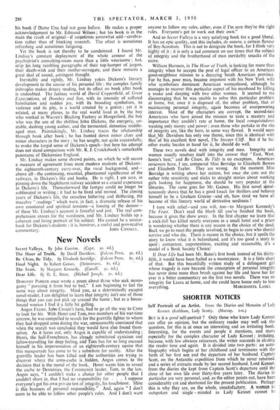New Novels
DOROTHY PARKER once wrote a poem about those who seek mono- gamy "pursuing it from bed to bed." I am beginning to feel the same way about integrity. Mind you, as a determinedly escapist novel-reader, I am delighted to learn that integrity isn't one of those things that you can just pick up around the home ; but as a house- bound woman I find it a little bit galling. Angus Frazer, John Cousin's hero, had to go all the way to Crete to look for his. With Henri and Tom, two members of his war-time aircrew, he was compelled to search for the guerrilla fighter to whom they had dropped arms during the war, unreasonably convinced that when the search was concluded they would have also found them- selves. As it turnsout, only Angus is capable of understanding ; Henri, the half-Frenchman, has already substituted cynicism and fellow-travelling for deep feeling, and Tom has for so long encased himself in his impersonation of an eighteenth-century squire that this masquerade has come to be a substitute for reality. After the guerrilla leader has been killed and the authorities are trying to discover where the arms-cache is _hidden, Angus comes to the decision that is the moral of the book. Henri wants him to reveal the cache to Demetrias, the Communist leader, Tom, to the law. Angus says, "I couldn't make a choice for other people that I couldn't share in, that I had no responsibility for . . . I suppose everyone's got his own private test of integrity, his touchstone. Mine is this business of personal responsibility." And, again "I don't seem to be able to follow other people's rules. And I don't want
anyone to follow my rules, either, even if I'm sure they're the right rules. Everyone's got to work out their own."
And so Secret Valleys is a very satisfying book for a good liberal. It has an epic quality, and_ this includes, de natura, a certain flavour of Boy-Scoutism. This is not to denigrate the book, for I think very highly of it ; it is only a sad comment on our times that the subject of integrity and the brotherhood of man inevitably smacks of the naïve.
William Harmon, in The Hour of Truth, is looking for more than integrity when he accepts the post of legal officer to an American good-neighbour mission to a decaying South American province. For he has, poor man, become impotent with his New York wife who symbolises dominant American womanhood, although he manages to recover this particular aspect of his manhood by killing a snake and sleeping with two other women. It seemed to me discouraging that he was unable to solve this particular problem at home, but, once it is disposed of, the other problem, that of maintaining personal integrity, again becomes of overpowering interest. Most of the characters are corrupt, the second-rate Americans who have joined the mission to taste a mastery and importance they couldn't rate at home, the local conquistadores wanting only money and power ; even those who partake in the rite of integrity are, like the hero, in some way flawed. It would seem that,Mr. Davidson has only one theme, since this is identical with that of his excellent first novel, The Steeper Cliff. But if he ha.: other exotic locales in hand for it, he should do well.
These two novels deal with integrity and men. Integrity and women usually resolves itself into the answer that "East, West, - home's best," and Be Clean, Be Tidy is no exception. American reviewers have, I see, compared Miss Berridge to Elizabeth Bowen and Elizabeth Taylor. They are wrong. At the moment Miss Berridge is writing above her station, but once she cuts out the rather trite sensitivity and sticks to straight stories about working girls looking for happiness, she should be very popular at the libraries. The same goes for Mr. Gaines. His first novel simul- taneously shows that he has a good knack for thrillers and believes himself to be a Graham Greene—and oh, how tired we have all become of this literary world of derivative seediness !
I turn with relief—and you will, too—to Margaret Kennedy's The Feast. Don't read the blurb till you've finished the book, because it gives the show away. In the first chapter we learn that a rock-fall has killed nearly everyone in a small hotel and a priest is wondering whether there is any reason in the choice of the dead. Back we go to meet the people involved, to begin to care who should survive and who die. There is reason in the choice, but it spoils the story to know what it is beforehand, and it's too good a story to spoil; competent, unpretentious, exciting and reasonable, it's a model of a Book Society Choice: If Dear Life had been Mr. Bates's first book instead of his thirty- fifth, it would have been hailed as a masterpiece. It is a little short of that. But this beautifully written study of a delinquent girl whose tragedy is sure becauge the conception of personal integrity has never done more than brush against her life and leave her for ever is a bitter commentary on the first two novels. There was no integrity for Laura at home, and she could leave home only to lose


































 Previous page
Previous page